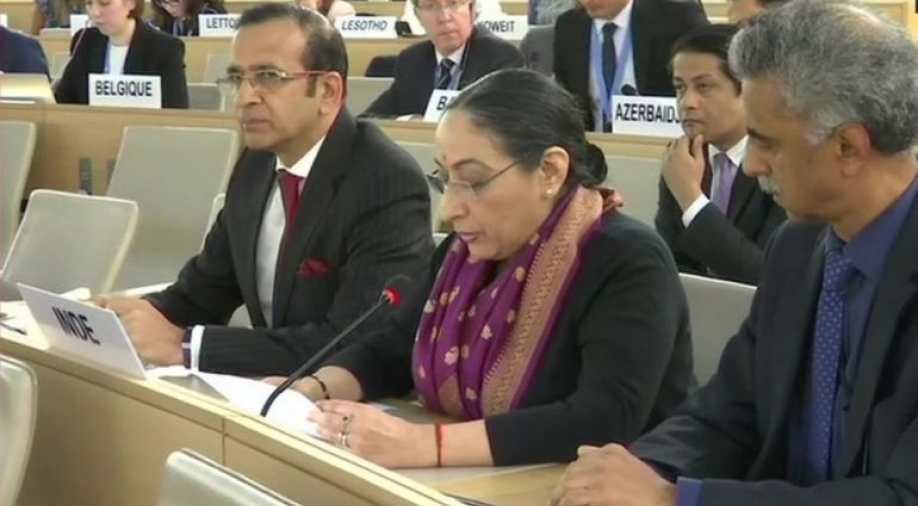Propagating Fabricated narrative on Kashmir: Says India at UNHRC
 GENEVA : Pakistan’s remarks about Jammu and Kashmir at the United Nation’s Human Rights Council today were no more than “offensive rhetoric, false allegation and concocted charges”, India said in a powerful rebuttal.
GENEVA : Pakistan’s remarks about Jammu and Kashmir at the United Nation’s Human Rights Council today were no more than “offensive rhetoric, false allegation and concocted charges”, India said in a powerful rebuttal.
Without naming Pakistan, Vijay Thakur Singh, a secretary of the foreign ministry, pointed to its terror links and said, “We should call out those who are misusing this platform for malicious political agendas under the garb of human rights”. Minutes later, separately exercising the right to respond, India said Pakistan has no locus standii to speak on Kashmir.
“Pakistan today pretended to speak as the voice of the global community on human rights. But the world cannot be fooled. Pakistan’s gory record speaks for itself. This rhetoric will not distract international attention from Pakistan’s persecution and elimination of religious and ethnic minorities,” India said.
India opposed Pakistan’s efforts to flag the Kashmir issue in the United Nations Human Rights Council, rejecting allegations of “atrocities” in the region while accusing Islamabad of misusing international platforms to further its own “malicious” political agenda.
In its pitch before the global body earlier in the day, Pakistan had criticised India’s decision to scrap Jammu and Kashmir’s special status and demanded that its dispute with India be “resolved on the basis of the UN charter, relevant UN Security Council resolutions and bilateral agreements”. Diplomats Ajay Bisaria and Vijay Thakur Singh are leading the Indian delegation in the rights council.
MEA’s Secretary (East) Vijay Thakur Singh made a statement on India’s behalf at UNHRC. Hitting out at Pakistan, she said, “The world is aware that this false narrative comes from the epicentre of terrorism.”
Scrapping Article 370 was a parliamentary decision aimed at ending discrimination against our citizens in Jammu and Kashmir. Progressive policies will now be applicable to them, ending gender discrimination, protecting juvenile rights and giving them the right to education, information and work.
Vijay Thakur Singh said, “The decision (to revoke Article 370) was taken by our Parliament. These were sovereign decisions which is entirely India’s internal matter. Basic services are being eased gradually (in Kashmir). My government is taking affirmative action by adopting progressive policies to promote socio-economic equality and justice.”
In another effort to internationalise the strictly internal Indian matter of Jammu and Kashmir, Pakistan has ramped up its rhetoric against New Delhi at UNHRC in Geneva.Pakistan Foreign Minister Shah Mehmood Qureshi has said that Kashmir is not a country-specific situation and India altering status of Kashmir is illegal. Qureshi also said that all political leaders of the region are under arrest.
Despite challenging circumstances, Jammu and Kashmir’s civil administration is ensuring basic services, essential supplies, mobility and near-complete connectivity. Democratic processes have been initiated, and restrictions are being eased continuously.
The world, in particular India, has suffered greatly due to state-sponsored terrorism. We must speak out because silence emboldens terrorists and their supporters. This particular nation (referring to Pakistan) conducts cross-border terrorism as a form of cross-border diplomacy.
A certain delegation has been giving a running commentary with offensive rhetoric of false allegations and concocted charges against India. But the world is aware that this narrative comes from the epicentre of global terrorism, where ring leaders were sheltered for years.
We should call out those who are misusing this platform for malicious political agendas under the garb of human rights. They speak on the human rights of minorities in other countries whilst trampling on them in their own country. They cry victim when they are actually the perpetrators.(With Agency Inputs ).

